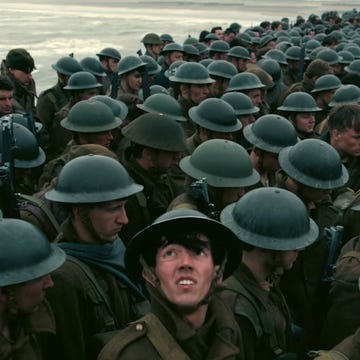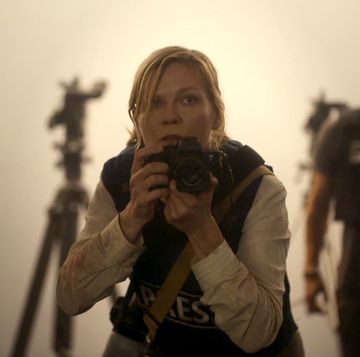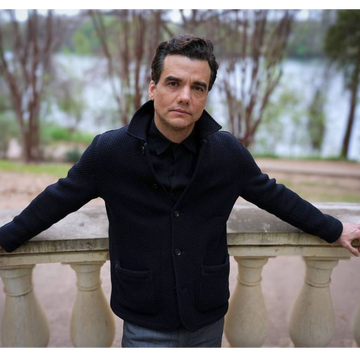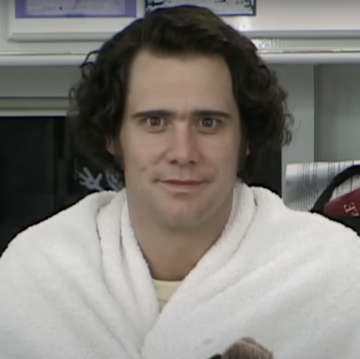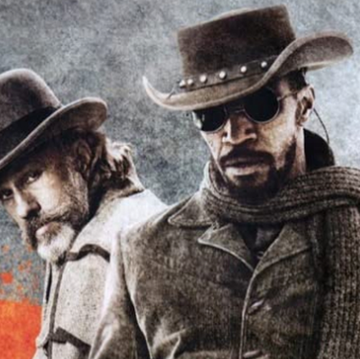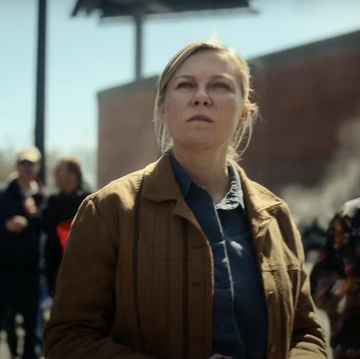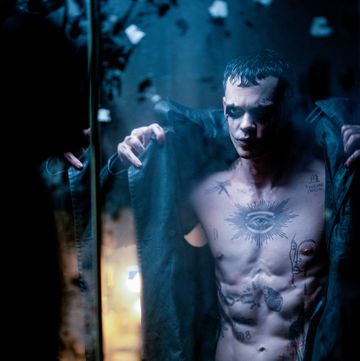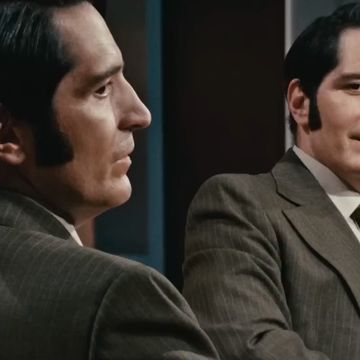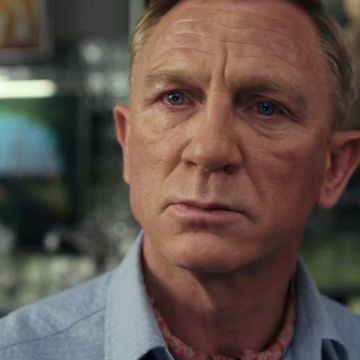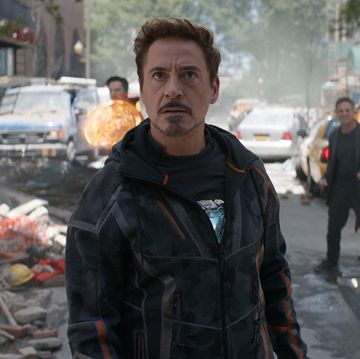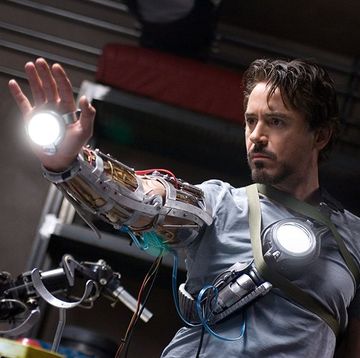UPDATE:Soon, you can see it in theaters again!
Aykroyd. Murray. Ramis. Reitman. Believe it or not, it was 30 years ago that four brave men came together to battle ghosts, goblins, and, even scarier, New York City traffic. We take a look back at the making of the classic comedy and find that despite a stellar cast and a whole lot of slime, the production could have been a disaster of biblical proportions.
We're Ready to Believe You
DAN AYKROYD: In about 1981, I read an article on quantum physics and parapsychology in The Journal of the American Society for Psychical Research. And it was like, bang--that's it. It was also a combination of my family's history--my great-grandfather was an Edwardian spiritualist, and my mother claims she saw an apparition of my great-great-grandparents while nursing me-and watching films like the Bowery Boys' Ghost Chasers and Bob Hope's The Ghost Breakers. I thought, "Wouldn't it be great to update the ghost movies from the '40s?"
Originally I was writing it for me, Eddie Murphy, and John Belushi, and I was about a third of the way through. On a beautiful March day, I was writing a line for John when the phone rang and it was Bernie [Brillstein]. He told me that John had died in the Chateau Marmont. I finished the script with Bill Murray in mind.
BERNIE BRILLSTEIN: Dan came to my office with this whole scheme about three fellows who chase ghosts. He even had a sketch of the Marshmallow Man.
AYKROYD: They were like vacuum cleaner or elevator repairmen, or firemen. The idea was to have them blend into the urban landscape. Calling a Ghostbuster was just like getting rats removed.
MICHAEL OVITZ: Dan and Bernie got me the script just as I was going to London. I read it on the plane, and I was laughing so hard that it was embarrassing.
IVAN REITMAN: I was told about the idea before, back in the Belushi days. It just didn't register, and I didn't pay much attention to it. But finally, I read it and thought, "Wow, this is an amazing idea." But it would have cost something like $200 million to make. It took place in the future, with many groups of Ghostbusters functioning in an intergalactic setting.
OVITZ: That's just Danny. He's never written anything that doesn't have intergalactic stuff.
AYKROYD: It was a lot darker. And scarier.
REITMAN: I had lunch with Danny at Art's Delicatessen, and I basically said, "There's a great idea here, but the script you've written is impossible to make. Don't you think we should set it on planet Earth and not in the future, which would make all the extraordinary stuff feel funnier?', And then I pitched the idea of having them start at a university. Dan was great, and very open. So I called up Harold Ramis and pitched him what I wanted to do.
HAROLD RAMIS: They came by after lunch and Danny gave me the one-line version of it, which basically was ghost janitors in New York. Ivan said that maybe I could play the third Ghostbuster and rewrite the script with Dan.
We Got One
REITMAN: I had a meeting with Frank Price at Columbia where I basically told him the story.
FRANK PRICE: The premise sounded terrific. But it was a controversial project because it was an expensive comedy, and the common wisdom in town was that comedies had a ceiling in regard to how much they could make. This one would have stars like Bill and Danny, so there were those expenses. Plus, all the special effects.
JOE MEDJUCK: I remember Ivan picking up the script in his hand and saying, "It feels like $25 million."
OVITZ: It was a go if the budget was $25 million.
REITMAN: Frank said that it has to come out in June 1984. This was May 1983, so I took a deep breath, and we said yes.
PRICE: I was about to green-light the film, then Columbia corporate [in] New York, which was Fay Vincent and Dick Gallop, came out to meet with me, their purpose basically to stop me from making this picture. I wouldn't listen to reason so they returned to New York to report that I was out of control. And I green-lit it.
Are You the Gatekeeper or the Keymaster?
RAMIS: We very quickly came up with a model: Dan was the heart of the Ghostbusters, I was the brains, and Bill was the mouth.
I found my character on the front page of an abstract architectural journal. There was a picture of a guy and an article about his work. I didn't understand a word, but his image was great. He was wearing a retro three-piece tweed suit, wire-rim glasses, and his hair was standing way up. I thought, "That could be my guy." I took the name Egon from a Hungarian refugee I went to grammar school with, and Spengler was from [noted historian] Oswald Spengler.
REITMAN: For the Dana character, I started doing auditions and meetings with young actresses, and I remember meeting Julia Roberts. I thought, "Wow, what a lovely person."
Sigourney Weaver walked into my office. She had done Alien and The Year of Living Dangerously, really heavy stuff. She said, "I can be funny. I did comedy when I was at Yale Drama School." And I'm not believing her at all.
SIGOURNEY WEAVER: I had to blow my own horn because I hadn't really done a film comedy, but I had done many onstage.
REITMAN: [While doing the terror dog scene] she gets on my couch and starts panting like a dog. And I'm laughing because here's this six-two, really beautiful, sexy woman, jumping around, doing this very funny stuff.
WEAVER: I wanted to show him that I was totally open to howling, screaming, and slobbering. I remember thinking afterwards that I may have frightened him a bit because I did tear into his cushions.
MICHAEL C. GROSS: When the effects guys found out it was going to be Sigourney, they were in heaven. All they could think about was that underwear shot in Alien.
REITMAN: I remember calling John Candy, and he started pitching me his idea for Louis. He wanted to play him as a German guy with a bunch of dogs. I think he was looking for a starring role at this point in his life, and he wasn't particularly enthusiastic about being in the movie. And we didn't want any more dogs. We thought that would be confusing. So we decided to pass, which really hurt.
MEDJUCK: If you look at the [original] storyboards, they look like John. Then we saw Splash, and he was playing very much the same role. He never said this, but my guess is he just didn't want to keep playing that role.
REITMAN: I knew Rick Moranis from Canada. I said, "I went to John, and he passed." Rick said, "He's nuts; this is a great part and I want to do it." He just jumped right in, and we tweaked it specifically for him.
RAMIS: Aykroyd used to look at me, Rick, and Bill, and say, "Three directors, four writers, no waiting." If you didn't have a good idea, someone else would.
Who Am I Gonna Call?
MEDJUCK: We really loved the title, but there was once a TV show called The Ghost Busters, so the rights hadn't been cleared.
PRICE: The title was controlled by Universal, and they blocked it.
GROSS: We tried other titles, but nothing worked. So we started shooting without one.
MEDJUCK: I was on the phone with someone at Columbia, and I held the phone up and said, "Look, I got 300 extras on the street yelling, 'Ghostbusters, Ghostbusters.' You gotta clear that title."
PRICE: As fate would have it, early on in production, Columbia and I were parting ways. And I wound up as head of Universal Pictures, so I was in a position to make the decision for Universal to let Columbia have the title.
Live from New York
ANNIE POTTS: I had just gotten to New York and went down to the set to meet everybody. All of a sudden, Ivan said, "Oh, great, you're here, we'll just put you in the scene." I was in my street clothes so I grabbed a coat out of wardrobe and pulled the glasses off the dresser's face and put them on. Regrettably, I was stuck with those prescription glasses for the rest of the shoot. She would give them to me right before a scene.
RAMIS: When we were shooting the big climactic scene on Central Park West and 65th Street, we stopped traffic in 90 percent of Manhattan.
GROSS: From the top of [55 Central Park West], we could see traffic backed up all the way to Brooklyn. We shot at five o'clock during rush hour, and truthfully, the city should have said, "You can't do this."
LASZTO KOVACS: This limousine kept trying to make a left turn. And a police sergeant moved him on. A half an hour later, he's back. The policeman got so mad because the guy rolled down his window and started arguing. Another cop came over, and they pulled the guy out through the window of the limousine. The cop then said, "Now, you walk."
GROSS: I saw a cop draw a gun on a cab driver who wouldn't listen.
MEDJUCK: The Cotton Club was also shooting in New York. The night we were shooting the Marshmallow Man, some guy said to me, "This is insane, what's this movie?" I said, "The Cotton Club, man. That guy Francis, you can't stop him."
GROSS: Joe and I were at the Mayflower Hotel having a drink, and a guy comes in and says, "Goddammit, it took me two hours to get from 13th Street to here because they're making a fucking movie." Joe and I realized we had on badges that said Columbia Pictures, so we quietly slipped them off and put them in our pockets.
AYKROYD: Isaac Asimov came out of the building, and I said, "Hi, we're shooting this paranormal adventure fantasy comedy named Ghostbusters." And he said, "You guys are inconveniencing this building, it's just awful; I don't know how they got away with this." And he kind of snorted, huffed, and walked away. I thought it was ironic that this guy that we all admired would hate our little enterprise.
Human Sacrifice, Dogs and Cats Living Together, Bill Murray! Mass Hysteria!
OVITZ: Bill is like the Mayor of New York. He knew every doorman and everyone in every restaurant. He would go to an ATM machine, get a couple thousand dollars' worth of small bills, and pass them out to homeless people as we walked down the street.
RAMIS: Bill and Dan were just legendary in the city. People would open restaurants for us two hours before they were supposed to, or they'd keep them open two hours after they were supposed to close. Suddenly, New York felt like a small town to me.
ERNIE HUDSON: Cab drivers would just stop in the middle of the street and jump out of their cars because they were huge fans of his. It was funny to see the way people responded to Bill, especially women.
AYKROYD: I think we all grabbed a few crinkles just from the enjoyment of seeing what walked around in the wake of Bill Murray. Women were falling, I mean, I had to help them into taxis. We actually had to escape on police bikes one night.
WEAVER: Bill was kind of expected to come up with brilliant things that weren't in the script, like day after day after day. Ivan would say, "All right, Bill, we need something here." And there would be like a hundred of us waiting around, and Bill would just come in and do something. It was absolutely effortless. The one I remember clearly is when we come into my apartment for the first time and there was a piano next to the door. He plays it and says, "They hate that."
Slimers and Marshmallow Men
MEDJUGKI: The Stay-Puft Marshmallow Man scene is one of the things that is almost exactly the same as it was in Danny's original script.
AYKROYD: My old friend the Viking is a great artist, and we just sat down, and I said, "I want a cross between the Michelin Tire Man and the Pillsbury Doughboy, and put him in a little sailor hat." I swear, we laughed our asses off when we saw the sketch of that fucking thing.
RAMIS: He looks so benign and then turns so malevolent.
AYKROYD: All those brand symbols are cure puffy little things, but when you blow them up to 300 feet high marching down Broadway, they don't seem so benevolent anymore.
SHELDON KAHN: I was afraid about the marshmallow man, because reading it in the script I didn't know if it was going to be something the audiences would moan about.
REITMAN: I was really worried that the audience would be taken out of the movie. But they actually just started screaming as soon as they saw that silly head.
AYKROYD: My father read the script and said, "Don't put him in there. It just won't come across." Thank God I didn't take his screenwriting advice. I'll take it for everything else in life.
WILLIAM ATHERTON: I saw this 150-pound bag of shaving cream, and said I wasn't going to do [the scene where the Marshmallow Man explodes]. They said, "Oh, come on, man, you're not going to be a pussy, are you?" So I went up to Ivan and said, "Couldn't we test it?" and he said, "Sure." So they got a stuntman or somebody expendable, and it knocked this poor guy down. They ended up using about 75 pounds.
HUDSON: After about eight or nine hours, that stuff started to really irritate the skin. A couple of us got rashes and little bumps. Very, very abrasive.
REITMAN: Slimer basically looked like a piece of plastic on a stick, but we really didn't have time to do much better. And he was in the spirit of Belushi.
AYKROYD: We were thinking along the lines of giving a Belushi element to the character. It wasn't really said in the script that he should look like Belushi, but when subliminally he turned out like that, I think we were all happy.
RAMIS: It was this kind of gluttonous spirit, making a mess everywhere. John was the guy most likely to trip over your coffee table and knock your bookcase over. It wasn't malicious.
REITMAN: We all thought it would be funny to have a ghost who wanted to eat all the time.
I Ain't Afraid of No Huey Lewis
REITMAN: We kept looking for a song for the montage in the middle of the movie. I was a big Huey Lewis fan, and I put in "I Want a New Drug," as a temp score for screenings. And it seemed to be a perfect tempo, and we cut the montage to that tempo. When it was time to mix the movie, someone introduced me to Ray Parker Jr., and he comes back with a song called "Ghostbusters" that has basically the same kind of riff in it. But it was a totally original song, original lyrics, original everything.
RAY PARKER JR.: I came up with the music pretty quickly; the lyrics were the hard part. How was I going to put this word Ghostbusters into the song? One night I was watching TV, and a commercial came on that reminded me of the Ghostbusters with their backpacks. And it occurred to me, the only way to do this was for me to never sing the word Ghostbusters. And once I came up with that concept, the rest was a lot easier.
REITMAN: I said, "This is a great song. I think it's a hit."
PARKER JR.: Ivan called me at three o'clock in the morning and said, "I already took the cassette you gave me and put it into the 35mm mag." I guess he really liked some of my slang language from Detroit. He kept saying, "I like the way you say, 'I ain't 'fraid of no ghosts,'" and I said "That's going to be the background vocal," and he's like, "No, no, it's fine, let's keep it the way it is." He wanted to make it into a record.
REITMAN: We showed it to Clive Davis because we were trying to get a record deal. He listened to it and said, "Look, I think the movie's great, but I don't think this song's ever going to be a hit."
PARKER JR.: Clive didn't like the song at all. But if you think about it, all my hit records were basically love songs to women. And all of a sudden, I'm singing to a ghost.
REITMAN: Of course, it then became the number-one song in America.
GROSS: They played it ad nauseam. Many people said to me, "I love your movie, but can you get them to stop playing that fucking song on the radio?"
MEDJUCK: I remember friends of mine writing me from Africa, saying that there were people walking around playing "Ghostbusters" on their radios.
REITMAN: About six months later, we heard that Huey Lewis was suing us.
PARKER JR.: There were many lawsuits. When you sell that many records, I think everybody wants to say that they wrote the song.
REITMAN: We decided to settle even though I think there's a lot of songs that are similar to other songs, have the same beat. The fact that it had the same kind of bass hook doesn't in itself mean a copyright infringement.
They Came, They Saw, They Kicked Its Ass!
REITMAN: We screened the movie without any effects three weeks after I finished shooting.
MEDJUCK: It was a raucous audience, so I turned to Ivan and said, "If they don't like it, they're going to beat us to death."
REITMAN: When Dana opened up her fridge, we cut to a shot that said, "Scene missing." People went nuts.
RAMIS: The audience was so happy with it, they were even cheering the cards.
REITMAN: It actually heightened their imagination. I said, "Oh, God, I don't think I can put anything in as good as what they're imagining."
RAMIS: [The finished effect] always seemed a little cheesy to me.
REITMAN: There's something about the hokeyness of the effects that makes [them] quite endearing.
OVITZ: We did an opening in L.A. for charity. It was totally an industry audience and the reaction to the movie was very mild, even though we raised a million dollars for a hospital. Several executives from other companies walked by and gave me their condolences.
PRICE: You've got a lot of people sitting there hoping it's a failure. A few days later, I saw it with a real audience, and it confirmed what I knew it was.
REITMAN: You never expect that big a hit. But there was a great sense that we were doing something special right from the beginning.
OVITZ: There was no jealousy, there was nobody bad-mouthing anybody, there was no negative press. This was one of those things where everybody just had a great time and made a great movie.
AYKROYD: I was delighted with how my original idea translated to screen, even though we went through many changes up, down, sideways, and backwards to get where we had to be. But that's collaboration.
RAMIS: We really, genuinely felt we were writing the most successful comedy to date.
HUDSON: People were coming up to me in stores wanting me to sign their grocery bags.
PARKER JR.: If I died tomorrow, there would probably be a blip on the news [referring to me as] the guy who came up with "who you gonna call."
WEAVER: Suddenly, everyone knew who I was. Kids would come up to me and say, "Did you really turn into a dog?"
RAMIS: Teachers were writing me saying, "Kids were playing Ghostbusters in playgrounds, and it was very good. It wasn't about one set of kids versus another like cowboys and Indians. They were working together fighting evil spirits."
AYKROYD: People in the paranormal field loved it. It gave focus to their work.
ATHERTON: The movie had just opened and I was doing a reading for Joe Papp in New York. So I'm walking down 7th Avenue, and there's this big Ghostbusters marquee, and there are all these buses filled with kids. But I'm not registering it too much, I'm thinking about Chekhov. And all of a sudden about eight million kids lean out the windows and yell, "Hey, dickless."
WEAVER: I once had a fire in mv apartment, and the firemen came to put it out. One of them opened up my refrigerator and said, "Whoa, you better call the Ghostbusters."
GROSS: Somebody went to an air show that had B-52 bombers, and one of them had the Ghostbusters logo painted on the nose. At that point the Cold War was still on. I thought, "This is nice; one day when the windows light up with the blast of the falling bombs, I'll know that over Moscow, there's a plane with the Ghostbusters logo dropping the big one."
Originially printed in Premiere Magazine.




